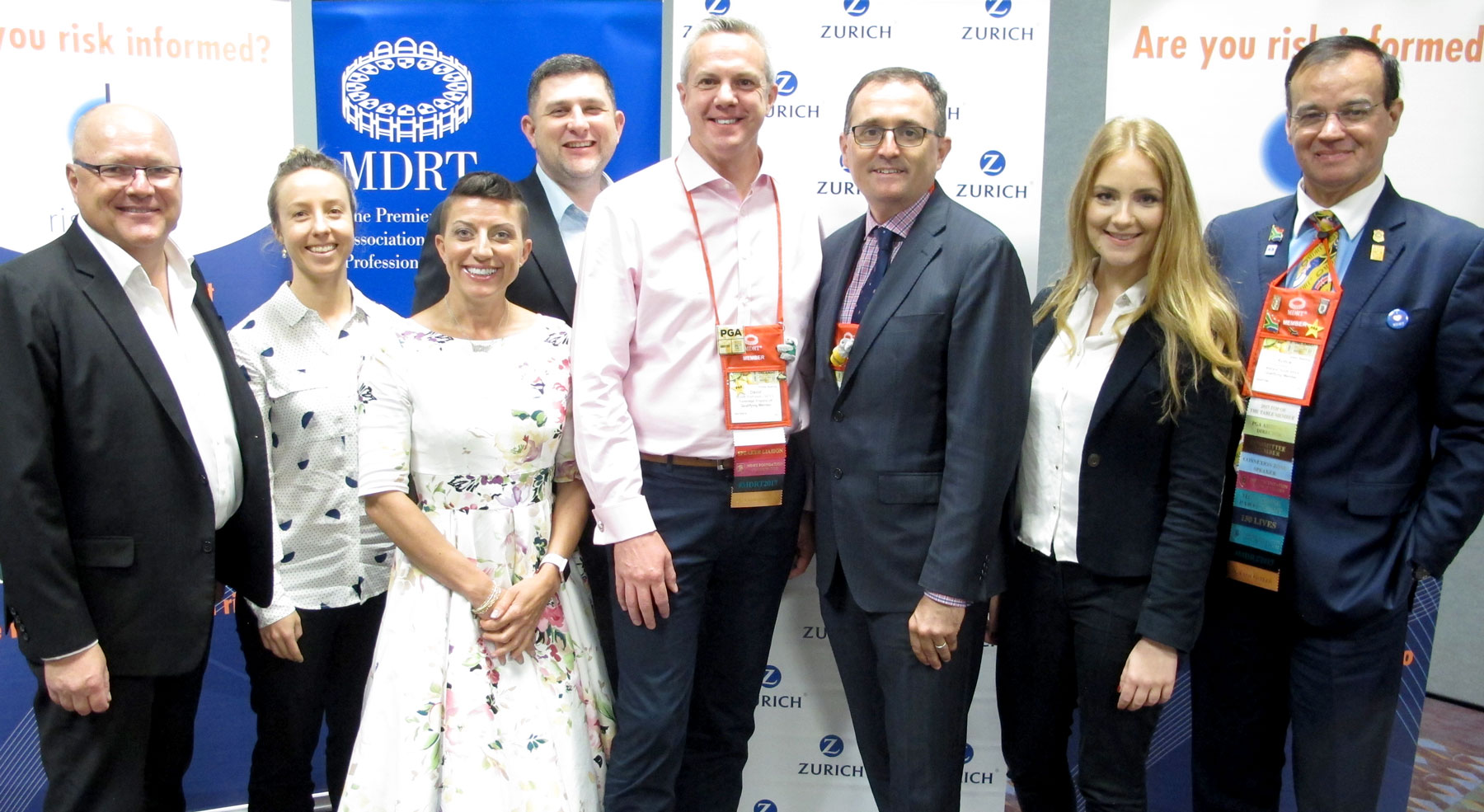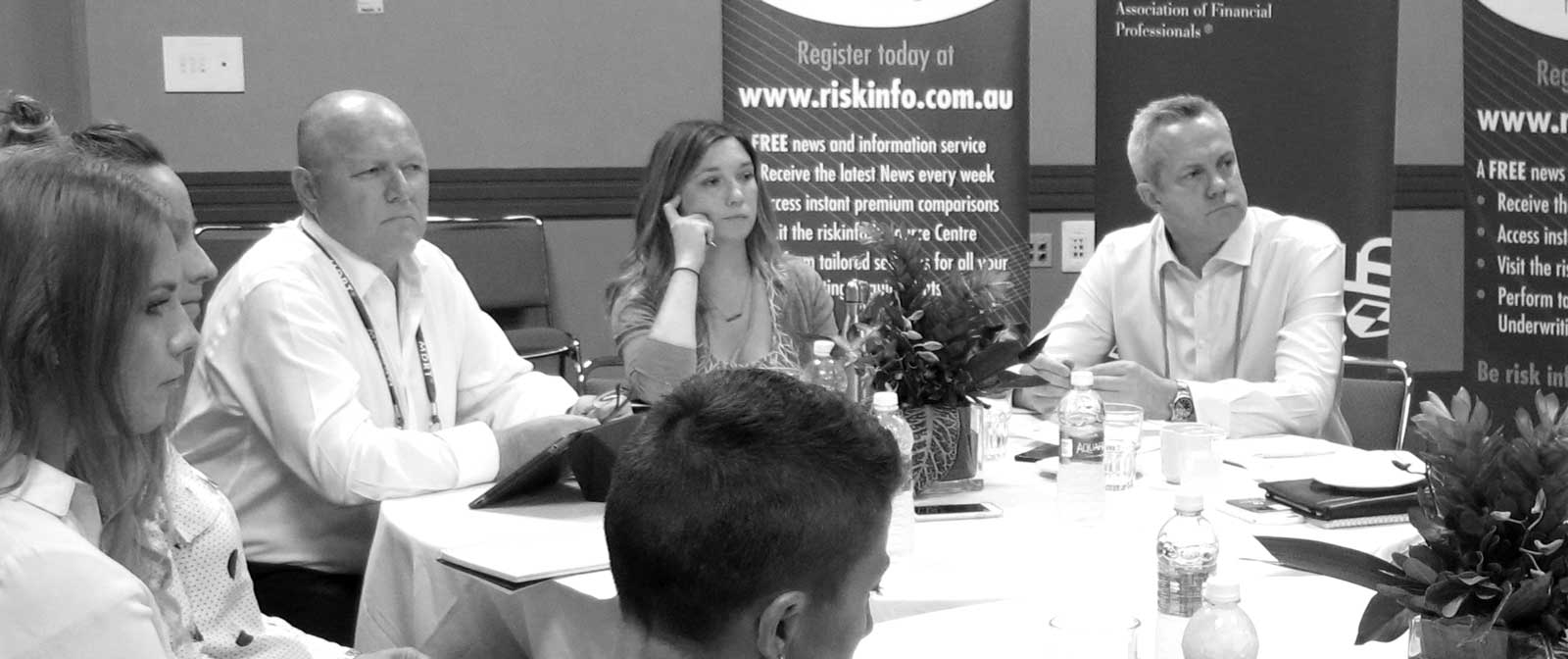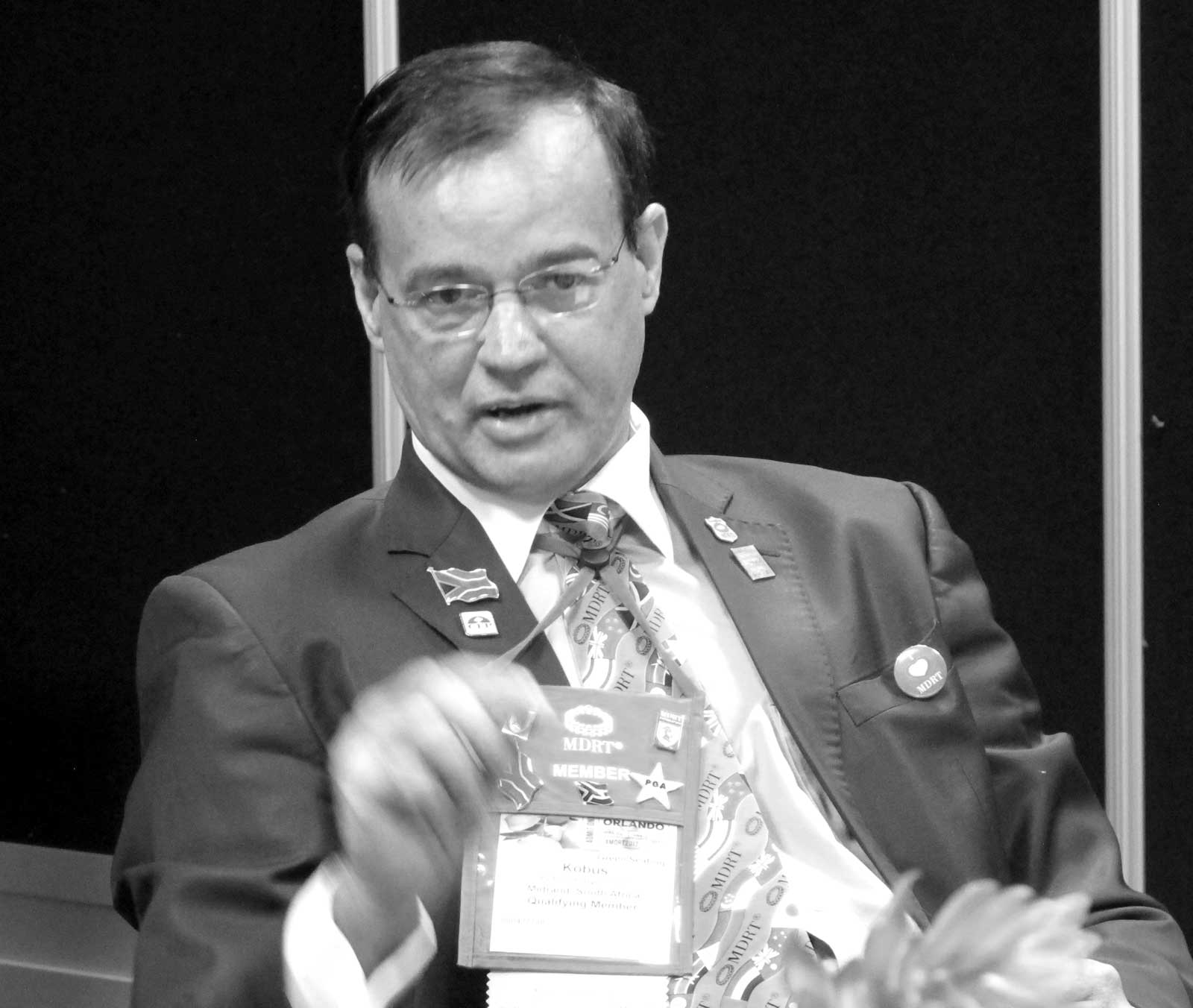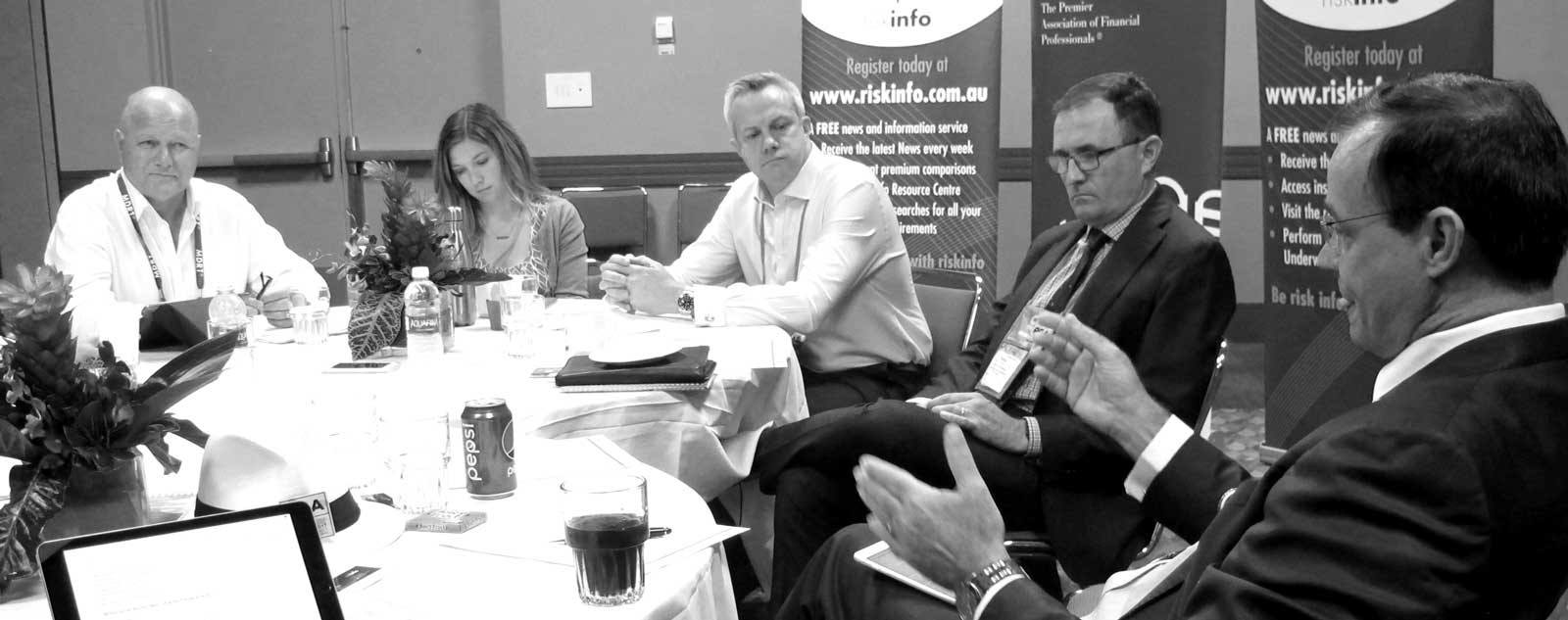Riskinfo joined forces with the MDRT organisation and Zurich in an International Adviser Round Table discussion on the changing nature of the ‘Value of Advice’ equation…
Part 1
Table of contents (Click these links to move directly to those topics)
- The value proposition
- Value of advice challenged by changing consumer behaviour
- Consumers, advisers differ on what constitutes value?

Panelists (L – R)
- Peter Sobels – Publisher, Round Table Moderator
- Dominque Schuh – Australian MDRT adviser member
- Michelle Hoskin – Standards International, United Kingdom
- Ryan Pinney – US MDRT adviser member
- David Braithwaite – United Kingdom MDRT adviser member
- Mathew Fogarty – MDRT Oceania Chair, Co-host
- Jessica Brady – Zurich Financial Services Australia Senior Exec – Sponsor/supporter
- Kobus Kleyn – South Africa MDRT adviser member
Our 2017 MDRT International Adviser Round Table asked advisers from around the world to reflect on the potentially changing nature of the ‘Value of Advice’ equation.
We wanted to know how advisers from different countries saw the future for financial advice in general and life insurance advice in particular, as it relates to the delivery of value to the consumer.
We sought their views on the key issues directly impacting their own advice business, as well as those affecting the life insurance and financial services sectors in their country:
- In a changing world, is the ‘value of advice equation’ changing with it?
- If so, how are the following elements taken into account in a changing ‘value of advice’ equation:
- Remuneration
- Commoditisation
- Technology
- Is there a growing need for risk-focused advisers to clearly articulate to the consumer how they add value?
- What do you believe is the secret to unlocking the answer to addressing underinsurance in your country?
Our adviser discussion commenced with comparing notes on the ‘value of advice equation’ and whether it is changing or evolving.
Part 1
The value proposition – Back to top
Speaking first with South Africa’s Kobus Kleyn (Kainos Group), we referenced an article written by Kobus in a 2016 edition of the FIA Insight Magazine, in which he noted, “Our profession will have to pay closer attention to the real value that is inherent in the product that we sell to customers, namely our advice offering. Those who can leverage the value in their advice offering will prosper. Those who cannot will surely fall by the wayside.”
Kobus emphasised to the panel that true value lies in the advice; not the product: “The value proposition is what clients and prospects and the financial consumer will perceive out there and this must become the reality over the long term. So is it about products or is it about advice?” He stressed that the product must be a consequence of the outcome of long term holistic financial planning: “The value proposition is what differentiates,” he said, adding that “…a differentiator is not a product.”
Our profession will have to pay closer attention to the real value that is inherent in the product that we sell to customers, namely our advice offering
Looking to the future, which he believes is transforming much quicker in recent times with what he calls a tsunami of regulatory reform and an attitude change globally, Kobus added “We have to have people coming into our profession …willing to do long-term financial planning, not sell policies only for quick gains. Until financial advisers get away from selling products instead of rather ‘selling’ advice first …people will not be willing to pay for advice. Anybody can sell a product,” he said, “…but we should focus on selling and giving advice foremost.”
Kobus challenges his fellow financial advisers to ask themselves the question of whether they are offering product- or advice solutions to their prospects and clients. He also warned on new adviser entrants into the sector: “Until all financial services stakeholders realise that they should be focusing long-term on bringing new people into our industry and helping them to transform through continuous professional development, to become true financial advisers, and then financial planners and eventually certified financial planners or with similar designations – not product sellers, or product agents, our profession is going to find it tough to keep up with charging fees and especially where a lot of countries are doing away with commission of all sorts…”
US adviser, Ryan Pinney (Pinney Insurance) was asked for his perspective on the potential changing nature of advice. He told the panel, “Unfortunately for the US we’re trailing regulation compared to the UK and Australia and …I think that we’re going to end up in a worse place than either one when we finally land.”
Ryan was referring in particular to the recently-implemented and contentious US Department of Labor reforms, “…it basically changes the whole dynamic of how you have to interact with a client or a customer. We’re going to a fiduciary standard whereas before it was a – kind of a best advice standard.” He added, “I think it’s going to change the nature of advice from a legal perspective [and] there’s going to be a lot more compliance paperwork that’s needed.”
Ryan also envisaged higher levels of litigation that will accompany the introduction of the new US client fiduciary standards for advisers: “There’s also going to be a lot more lawsuits because it’s impossible to say today that one product is superior or the absolute best in any situation and have that recommendation stand the test of time.”

Asked whether these new standards will change the way that he will structure his business, Ryan noted the biggest advantage for his business was that the fiduciary standards were geared mostly towards investments: “…my business is risk-based and so from a risk-based perspective it has less impact today than it will in the future. But it’s coming…”, he warned.
Looking towards that future, Ryan voiced concerns about US risk-focussed advice business being required in future to introduce the US equivalent of an Australian Statement of Advice: “… unfortunately I’ve seen what a Statement of Advice from Australia looks like at 60-plus pages to sell a single policy.
We asked Ryan whether this may change the way that he will demonstrate or deliver value in future.
the value of advice equation has changed, particularly in Australia
“I think the question becomes what is value? People will buy things based on several factors, and I talk about this often. They’ll buy things based on convenience; they’ll buy things based on the speed or timeliness of the delivery; and they’ll buy things based on the actual intrinsic value of the product or service. So you have to decide which one of those are you going to go after? If it becomes harder to deliver actual intrinsic value then it will devolve to an economy where it’s commodity-based, as in how fast can I get it to you and how cheaply can I do it?
Queensland adviser, Dominique Schuh (Schuh Group), told the panel she has spent a reasonably short period of time in the industry, “…but even over that period I think the value of advice equation has changed, particularly in Australia. I’ve seen our jobs become more complex so then the value of what we do has had to increase. But the way we communicate that has had to improve as well,” she said.
Asked to summarise the changes she has seen in her seven years in the industry, Dominique (Dom) singled out compliance changes: “Mostly in compliance, just in what we’ve had to do for our clients and then having to work through the whole back office side of that to really get it as efficient as possible.”
Dom agreed there was a difference between adding value for life insurance advice compared with more holistic advice: “I’ve got some 80-plus year-olds who just want to have everything taken care of, so that conversation is around explaining to them, ‘…Well, this is what we’re actually doing for you. Is that okay?’ By contrast, some 20-year-olds might just need an income protection policy, so then you’re having a completely different conversation with them. But the same basis is around being able to explain [to our clients] ‘This is the outcome you’re going to get.’
“What of the future? I just think the complexity of it all is changing, which means that we have to keep adapting and …keep improving … he way that we communicate that. So it’ll keep us in a job in Australia!
Value of advice challenged by changing consumer behaviour – Back to top
Considering this question from the UK adviser perspective was David Braithwaite (Citrus Financial):
“It is being challenged,” said David – “… the value of the advice that we give to people over there. And the trouble that we have is that we as advisers don’t like change. ‘We’ve always done it that way and it’s kind of worked,’” he said, encapsulating a typical UK adviser point of view. “It’s very fragile the way in which we’re set up, because we get very engaged with clients. We want them to be our friends. We want them to love us and we like that they’ve bought from us. Therefore we’re all friends now and it’s that difficulty between going from that to actually demonstrating value,” he said.
David told the panel his own business is challenging what’s been the norm and they have been asking themselves how they can do things better. He also observed “And what we’re also finding is the demographic of the people that we deal with… have a different perspective of value.”
no-one wants life insurance. No-one wants a pension. They want what it does
He expanded, saying younger clients looking for a financial product will probably go online. “But Google’s only going to answer the question they’ve asked it. So once they get that far, then they’ll come to you. Now what we have to …say to them is ‘This is what we do. You want that but actually how about looking at it another way’.” David’s point was that this is how he adds value from an advice perspective. Agreeing with Kobus, David said “…it isn’t about the product. It’s the why; it’s what it does; not the product. And once we start looking at that it’s a different conversation because no-one wants life insurance. No-one wants a pension. They want what it does.”
Previously, said David, only the adviser had access to all the products “…so you could actually be lazy. You could just take an order and sell them a product and … you’ve got yourself a client.
David agreed this style of product-based advice service continues, but maintains the growing need for the adviser to demonstrate how they are adding value: “…we have to show how we’re adding that value,” he said.
“We’re working on things now where we’re getting our existing clients to be advocates for us and talk about the value that we added to them, and we’re coming up with different strategies for that. We’re looking at adding value when we go and see a client for a review instead of just turning up with a valuation, because they can go online and log in and see the value of their investments for themselves.
Notwithstanding the recent implementation of the UK’s retail Distribution Review reforms, David told the panel that not all of the changes in his business were brought about due to regulatory reform “…to actually keep your clients engaged you have to change the way that you deliver that advice and add that value. It’s all about that value…You want people queueing up to actually use you because you’re offering something a little bit different in the marketplace. And you have to stand out and be talked about by people in that way,” he added.
We need to find the people that value what we’re doing
Referring to Australian Statements of Advice, David said he can see a time in the UK where “…we’re going to have to do the Statements of Advice. So we want to be ahead of that curve and not get caught short and then have to deal with change. I’d rather be the implementer of that change; not have it forced on me,” he said.
David told his peers he was not interested in providing value for consumers who prefer to ‘shop’ online or at supermarket check-outs for life insurance and investment solutions: “They’ve now got an outlet [direct or online]. We need to find the people that value what we’re doing and focus on them and magnify it and multiply it.
Melbourne-based adviser, Mathew Fogarty (Financial Planning by Design)told the panel that when he first entered the industry in the late 1980s he was trained by others as a product-seller before eventually emerging as a needs/solutions-based planner: “I was selling product… that’s the way it was. You were recruited and if the client could afford $25 a week and you had your list of a hundred people and your best friends then that’s how you got started,” said Mat.
Fast-forwarding to today, Mat sees his evolved financial advice career as “…the best opportunity ever.” Following on from David’s point that he doesn’t want to provide his services to consumers who prefer direct or online solutions, Mat noted, “If I want to remain doing what I do, then as a business person you have to sit down and ask what it costs for me to deliver my advice. If I cannot stay in business, I’m useless to my clients. As an individual I can only give a limited amount of advice to so many people. So I’d probably agree that, yes, things are changing, such as the compliance regime.
Given the regulatory requirement in Australia for Statements of Advice, Mat sees his SoAs as “…the best position statement.” He says the process allows him to work out whether the prospective client is a good fit for his business. “And if they’re not a fit they become a liability to the business and I’ve learnt that over time, they just became a headache. So, for those clients I retain, they pay me for my advice, which is my product.

In terms of the changing nature of the value of advice, Mat subscribes to the growing importance of paraplanners to interpret fact find documents and construct Statements of Advice, thereby allowing Mat to maximise the time available to him to genuinely add value for his clients.
Mat sees himself and other advisers as facilitators: “It’s a learned thing and it’s mentoring and that’s what you’ve got to teach the new advisers coming through. And there’s also education of your clients,” he said, in terms of how he continues to add value to his client relationships over time.
until we want what we want, when we want it, you just have to be there to be found
Heightened mortality fears in the united Kingdom saw UK best practice business expert, Michelle Hoskin (Standards International), offer the panel a sobering perspective on the notion of consumer perception of the value of life insurance: “I’m 40 next year and obviously you’ve all seen the news about bombs going off at concerts and people being stabbed in central London and I swear to you two weeks ago was the first time I actually thought that I could be on a bridge or I could be at a concert or I could be in Borough Market and get stabbed,” said Michelle.
“The reality is there’s not a lot more you can actually do because I’ve been in financial services for 20 years and it took a bomb going off at a concert for me to want to buy more [life insurance]. So you can sell advice, you can sell value, you can talk about value but until we want what we want, when we want it, you just have to be there to be found.
The only advisers that I see question the value their clients are getting are the ones that seem to have this battle constantly because they have no confidence in themselves anyway. And the bottom line is the value – the clients that you want to value what you do are the clients that value what they do. We only live once, and even if I wasn’t in financial services I wouldn’t go and Google it [life insurance] because I can’t risk getting it wrong.
Asked whether she believes consumers in the UK will be more disposed to listen to the life insurance advice message, Michelle replied, “Absolutely. I’ve studied the playground at school and have been talking to the mums about many of them not having wills or any life insurance. I’m saying to them that they need to sort it out, and I’ve referred them to financial advisers. I did it two weeks ago in a playground. Do you know what I mean? It’s real.
Consumers, advisers differ on what constitutes value? – Back to top
Zurich Financial Services Australia’s Jessica Brady was asked for her view of the changing value of advice equation, based on the many conversations she has with advisers and advice business owners:
“I’m very fortunate in that I have spoken to so many advisers and there’s such a spectrum of where people sit. From an Australian perspective there’s been a really interesting period that we’ve all gone through. My observation has been that we have definitely moved from this kind of product-centric advice perspective. This conversation around value’s really interesting because I think what advisers grapple with is what advice they may think is valuable is not valuable in the eyes of their consumers.”
Jessica continued, “They’ve spent a lot of time considering products and strategies that they feel add value to their client, which I’m sure they do. But it’s not necessarily the same thing that their consumers value in their relationship. So the conundrum, I think, is around how you achieve alignment of values and understand what it is that the consumer will value and how you then make sure that the experience that you offer that consumer is in line with that, while still fulfilling all of the regulatory and compliance obligations,” said Jessica.
Walking the talk
Expanding on Jessica’s point about whether advisers and consumers differ when it comes to what constitutes value, Michelle asked the advisers on the panel whether they have walked in the shoes of their clients by having their own financial plan created for them by another adviser.
Our biggest blind spots are almost always the ones that we think we have already prepared for
For those advisers who have not actually been a client in their own financial plan, Michelle’s message is blunt: “You’ve not got a clue what it’s like to be a client unless you’ve actually been one.”
Ryan strongly supported Michelle’s point and there was general consensus from the panel that having their own ‘client experience’ is an invaluable commitment for all advisers.: “Our biggest blind spots are almost always the ones that we think we have already prepared for,” observed Ryan, who also suggested that if Riskinfo polled all MDRT members, asking them how many had their own insurance (or wrote it themselves) and a will and a trust of their own “…you would probably be dismayed at the results.”
Jessica: “Just to add to that point we’ve done some interesting research in a white paper and the findings were astounding. We asked financial planners about them and their business and how many of them had wills and how many of them had succession plans and very, very few businesses, especially when you think the average Australian adviser, who must be around age 55 – very few of them had considered succession. This includes advisers who provide estate planning advice. They’re thinking about creating clever strategies for their clients, yet very few had a done their own plans.

“If you think about financial advisers advocating the benefits of creating goals-based advice it’s quite scary how few actually have a business plan to begin with,” she said.
Jessica told the panel she is seeing a key trend emerging in the Australian market:
“There are still new adviser coming in being taught how to sell and they sell products. But there is also this new wave of younger financial advisers who are moving to more of a coaching style arrangement because they’ve realised that their clients actually value the coaching benefits of advice as opposed to potentially the underlying strategy.”
Jessica continued, “Absolutely, I think that advisers have really cottoned on to the fact that clients value cash flow management and are happy to pay for that. But it’s not something typically that would have happened as part of the advice remit ten years ago.”
Ryan again agreed, noting. “I think my number one sales pitch to my clientele of value provided is: ‘Here’s my own business plan and here’s my own succession plan. What does your current adviser have in place to take care of you once he retires?’”
Ryan believes this approach could take more clients away from advisers’ competitors than any single conversation they could ever have.
Michelle, Ryan, Jessica and the rest of the panel strongly agreed that ‘walking the talk’ for all advisers was critical.
Under the theme of ‘Price is what you pay; value is what you get’, Kobus told his peers “…Our clients normally know what they’re paying for products …but value really is what they want to know they are receiving.” He believes the most important wants, needs and outcomes are peace of mind for the client and their family. “They simply want to know, ‘Is my daughter, my son, my wife and other dependants going to be taken care of when life happens and will I be ok when retirement comes about?”
